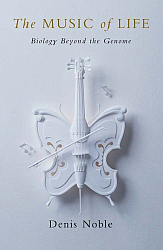Art and Science
What is life? So asked the distinguished physicist Erwin Schrödinger in his famous lecture at Trinity College Dublin in 1943. Now, after the full mapping of the human genome has yielded a code of three billion letters, we are still far from a satisfactory answer to this question.
Sometimes, when the answer to a difficult and complex problem appears to be far away, taking a different point of view often helps to find a better perspective. Maybe this is one of the reasons why many excellent scientists are at the same time passionate artists?
With the "Art and Science" events, ECCB aims to encourage a creative exchange between scientists and artists. We are happy to invite you to join us for a true dialogue between art and science: Join us for "Music of Life" on Monday, 10 September 2012.
Music of Life

Music of Life is the title of an elegant assay by emeritus Oxford Professor Denis Noble, in which he set out an alternative to the gene's eye view which has reaped so many rewards; a radical switch of perception in which genes are prisoners and the organism itself is a complex system of many interacting levels. And life emerges as a process, the ebb and flow of activity in the intricate web of connections, full of feedback between gene, protein, cell, organ, body and environment.
Basel was the beginning...
... are the exact words Prof. Denis Noble wrote into my copy of his book "Music of Life" at the presentation of the book at the Balliol College at Oxford University. About ten years ago, when we organized the first [BC]2 Basel Computational Biology Meeting, the keynote lecture was given by Denis about his work on the simulation of the heart rhythm. On the evening before the conference, we invited Basel classical guitarist Christoph Denoth for a concert at the [BC]2 speaker's dinner.
The following two videos from a interview at the university of Warwick describe what happened then:
How did you develop the idea for the book?
Q: How was the event at Basel?
Prof. Denis Noble
Denis Noble, CBE, FRS, is Emeritus Professor of Cardiovascular Physiology at the University of Oxford. He was Chairman of the IUPS (International Union of Physiological Sciences) World Congress in 1993, Secretary-General of IUPS from 1993-2001 and is now President of IUPS. His previous publications include the seminal set of essays The Logic of Life (Boyd and Noble, OUP 1993), and he played a major role in launching the Physiome Project, one of the international components of the systems biology approach. Science magazine included him amongst its review authors for its issue devoted to the subject in 2002. See "Music of Life" for more information.
Christoph Denoth
Christoph Denoth was born in Basel. He began his concert career aged 15. He trained as a soloist with Oscar Ghiglia at the Basel Musikakademie. Denoth has won numerous international awards, including at the 35th Concours International de Guitarre de Paris (1993). In 2008 he was awarded the UBS Culture Award for Music. He has performed as a soloist at Carnegie Hall in New York, at the Berlin Philharmonie, and at the Salzburg Mozarteum. He recently performed Rodrigo’s Concierto de Aranjuez in New York. Christoph Denoth endeavours to expand the tonal and dynamic range of today's concert guitar and bring it to the attention of a larger audience. Sergiu Celibidache, with whom he studied the Phenomenology of Music and Conducting, exercised an enormous influence on Denoth.
Denoth was Musician-in-Residence (2006-2009) at Balliol College, Oxford. He also was recently appointed Visiting Professor at the Royal Academy of Music London. He will play at Wigmore Hall London a BBC live solo recital October 15th. See www.christophdenoth.com for more information.










































